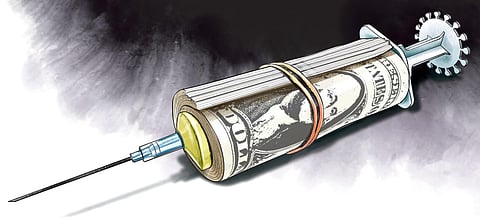

As yet another surge of Covid-19 infections seriously threatens to push back normalisation of the global economy and society further, it is imperative that governments work in a coordinated manner to alleviate its impact. Ensuring that Covid-related vaccines and other medical products are freely accessible at affordable prices to the citizens of every country should be on the top of their agenda, for this is the only way that the spread of the contagion can be stymied. Reflecting the need of the times, the President of the European Commission, Ursula von der Leyen, said, “A global pandemic requires a world effort to end it—none of us will be safe until everyone is safe.”
However, a heady mix of avarice of large pharmaceutical companies (the “Big Pharma”) even in the midst of this deadly pandemic, together with “vaccine nationalism” in the developed world, is preventing the rapid rollout of vaccines in most of the developing world. As early as in October 2020, India and South Africa had anticipated the emergence of such a situation and tabled a proposal in the World Trade Organization (WTO) seeking a temporary waiver from the members’ obligations to implement, apply and enforce four forms of intellectual property rights (IPRs), namely, patents, copyrights, industrial designs and trade secrets, for the prevention, containment or treatment of Covid-19.
The sponsors had justified their proposal arguing that since IPRs have been found to act as barriers to access and affordability of medicines, vaccines and medical products, a temporary waiver from the implementation, application and enforcement of these rights was necessary to ensure that these products reached everyone. This proposal has been co-sponsored by 59 countries and has the backing of almost two-thirds of the WTO membership. But six months since the proposal was tabled, no substantial discussion has taken place on the issues flagged by India and South Africa. The reason for this impasse is that developed countries have rejected any dilution of IPRs and have backed the interests of Big Pharma seeking to rake in their billions even during pandemic times.
Recent industry estimates have confirmed that Big Pharma and several biotechnology companies are viewing the pandemic as a windfall. The Guardian reported last month that three major players in the Covid vaccine business, namely Pfizer (collaborating with the German firm, BioNTech), Moderna and Johnson & Johnson are expecting an increase in their combined sales turnover by around $50 billion in 2021. The Chinese and the Russian vaccine manufacturers, Sinovac and Gamaleya Institute, funded by the Russian Direct Investment Fund, as also the American company, Novavax, are also estimated to increase their sales by billions of dollars. More importantly, operating margins of Big Pharma and the biotechnology companies are expected to be nearly 30% and 45%, respectively.
Big Pharma has usually justified its supernormal profits arguing that these are the incentives for taking excessive risks and undertaking large investments for carrying out research and development activities. The reality is that a none-too-insignificant part of the companies’ research funding has come from government sources. But the companies have not been transparent about disclosing the real magnitude of government support. However, there is ample evidence that Big Pharma’s Covid vaccine research received significant financial support from governments in several developed countries.
According to an article in Scientific American, the Moderna and Pfizer vaccines that use mRNA rely on discoveries funded by the US government for decades. In fact, the US federal government support for Moderna has been so substantial that many commentators have demanded that it be called the “people’s vaccine”, in recognition of the taxpayer dollars invested in it.
The irony is that despite investing taxpayer monies for the development of vaccines, the US government is allowing Big Pharma to pocket supernormal profits, instead of treating these critical products as merit goods that should be made available to the public at large at nominal prices. If the US and other developed countries are so strongly committed to supporting the penchant for profits of Big Pharma, is it reasonable to expect that they would agree to the India-South Africa proposal for making vaccines and medicines available to all?“Vaccine nationalism” has been one of the major stumbling blocks to equitable distribution of the Covid vaccines.
It is by now well known that several high-income countries have acquired enough doses to vaccinate their population several times over, while most developing countries are struggling to roll out their vaccine programmes. Yet another form of “vaccine nationalism” is being experienced by the Serum Institute of India (SII) as the company struggles to meet its vaccine supplies’ commitments. The US, on which the Indian vaccine producer depends for meeting its requirements of specialised bags and filters, cell culture media, single-use tubing and specialised chemicals, has invoked a Cold War legislation, the Defence Production Act, to choke exports, and to help in ramping up America’s domestic production of vaccines.
Biswajit Dhar
Professor, Centre for Economic Studies and Planning, School of Social Sciences, JNU
(bisjit@gmail.com)